Declan Swan is a man with two goals – developing his BTEC sports students and winning promotion for Sandbach United FC. It’s a game of keepy-uppy that fills his day from dawn till dusk…
For Declan Swan, football isn’t just a passion, it’s his profession both in and out of the classroom.
By day, he’s shaping the next generation of sports professionals as a lecturer at Stoke-on-Trent College. By night (and at weekends), he’s leading Sandbach United from the touchline.
It means his learners, who are aspiring sports coaches themselves, get an industry role model and mentor, as well as a teacher.
After a knee injury meant his childhood dreams of playing professionally came crashing down, Swan focused on helping others achieve their sporting goals – as a personal trainer, then as a scout for Manchester City and now as a college lecturer.
His packed schedule reflects the workload pressures on the ‘dual professionals’ – those with industry and teaching skills – we want in our FE classrooms.
No two days are the same for Swan, 33, who divides his weekdays teaching level 3 BTEC courses in sports science and sports coaching at the college’s two campuses, with Wednesdays devoted to planning and marking.
On Tuesday and Thursday evenings, and on Saturdays, he puts the coaching skills he teaches into practice by managing his own squad.
Here, Swan reveals his typical Tuesday…
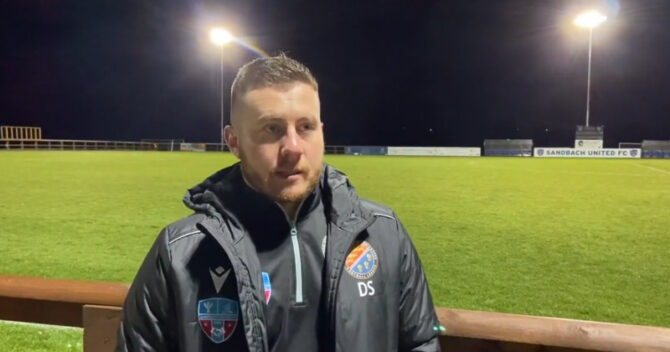
6.30am
I take my lovely brindle boxer dog, Lola, for a walk and sniff around our estate. Then, after showering and wolfing down some Shreddies, I jump in the car.
I’m a little tired as last night I was on an hour’s Zoom call doing a Football Association CPD session for coaches of non-league clubs like mine on how to develop players. I learned some useful tips to use in my teaching job too.
I’ve been a sports lecturer since 2022, first at Macclesfield College, then at Stoke-on-Trent College since June.
I always wanted to be a professional footballer as a kid, and at age 16, I did a similar course to the one I teach now at what was then Mid Cheshire College.
But I fell out of love with football altogether at the age of 20 after I dislocated my kneecap while playing. I was devastated. I couldn’t even watch a game on TV for a long time.
I had several operations to try to fix the tendon ligament damage, all unsuccessful.
These days I can go for a 5k run, but my knee will swell up and be quite sore for a couple of days.

7.30am
It’s an hour’s drive to Stoke-on-Trent College’s Cauldon campus in Shelton, which I spend making calls and visualising the day ahead.
I’ve been with Sandbach for four years now, initially as first team coach and then as manager since 2022. We’re third in the North West Counties South division out of 18 teams, so we’re hoping to get promoted into the Midlands Prem.
8.30am
Stoke-on-Trent College has grown massively in recent years, with over 2,000 young people currently on programme – it’s highest ever number. Adult learner numbers grew too from 5,000 to 6,000. Work is currently ongoing with two exciting capital projects to accommodate the increase, and the college has received funding for a new green technologies hub.
First, I head to our cafeteria for a free breakfast – my second of the day! My sports department colleagues and I gravitate to a table together. It’s nice spending that time catching up because I won’t see them again for the rest of the day.
9.00am
My mornings and afternoons mirror each other because I teach the same class in the morning (the level 3 BTEC sports coaching and development) as the afternoon.
It’s a two-year course for young people aspiring to become football coaches, professional trainers and gym instructors. I really enjoy teaching them how to coach because of my first-hand experience of it.
Today, my morning class of 27 (25 boys, two girls) learners are on a programme with Stoke City. My afternoon learners (19 boys, no girls) are with Port Vale.
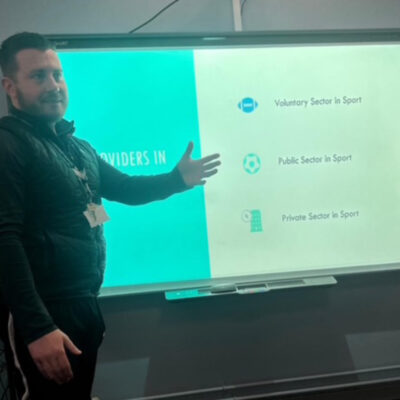
10.00am
I set my learners a presentation task about the sport development continuum – the tiers from beginning sport at a foundation level to being professional.
With more young people now spending their free time on consoles and communicating by messaging, my learners are not as used to face-to-face interactions. That means it’s getting harder for them to stand up in front of people and speak.
I often tell them that although I’m a confident speaker now, I was far from being the loudest person in class when I was 16.
But as a coach or trainer, you must be able to adapt to different settings. Personal trainers are often self-employed, so if they don’t have the confidence to speak to strangers to generate business, they’re not going to get paid.
During the 12 years I spent as a personal trainer, I built up my confidence in speaking to all sorts of people I wouldn’t otherwise have engaged with.
I was earning really good money but I hit a ceiling. I found I was teaching the same things, deadlifts and squats, over and over again.
Then one of my clients, a primary school headteacher, encouraged me to spread my wings and do coaching. I worked with her year 6 class while doing an FA level 2 qualification.
The team were pretty poor when I started, but it became one of the best teams in Cheshire.
I then worked as a scout for Manchester City’s academy in their development centres and trained their under-8s teams at the Etihad Stadium on Sundays.
Teaching and personal training involves working a lot of unsociable hours – early mornings, late into the evening and at weekends. So I moved into teaching, first as a school PE teacher before lecturing in colleges.
Coaching work was also very driven towards development but I missed the competitive element of the game. So I started coaching Sandbach to feed my competitive drive!
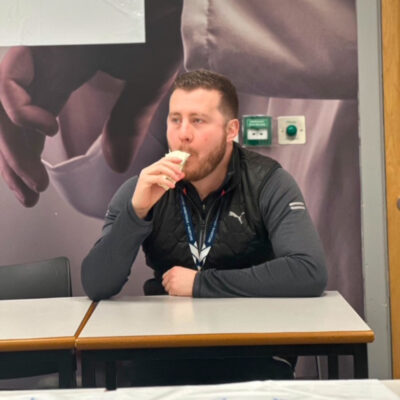
10.30am
I give my learners a break of 15 minutes – time for me to grab a drink of water and a bag of crisps. I’m always eating! I look at my phone to double-check the availability of the football squad I picked yesterday.
A rewarding part of teaching for me is seeing my learners return from their work experience placements full of beans, excited at how they were able to put into practice what they’ve learned in class and with more of an idea about the next steps for when they finish college.
We do have challenges in securing work placements but we’re fortunate to work with two very accommodating football clubs willing to give them a real insight into their clubs.
We have a learner in his second year on a placement in Port Vale’s women’s academy getting valuable experience of coaching high-level players. Others go into local high schools and grassroots football clubs.
When I get reference requests for my learners from universities or sports businesses, that’s when I feel like I’ve really had an impact on their lives.
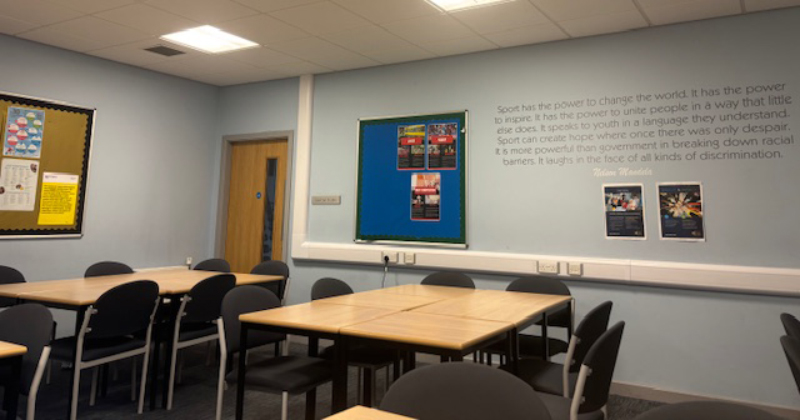
12.15pm
After a quick tidy-up of the classroom, I drive to my next class in Burslem.
There’s a lot more to being a football manager than my young learners first realise. While I’m driving, I might be on the phone to one of my players discussing a tactic or to my treasurer about budgeting issues. The job is 24-7.
1.00pm
My next lesson involves teaching about different coaching styles.
For example, command style is where the coach makes all the decisions and gives orders.
The drive-by coaching style is when you approach a player while a football game is in progress and then step away.
Then there’s guided discovery, where you ask the player a question and tell them to go find the answer for themselves. People retain information better if they’ve found out the solution themselves.
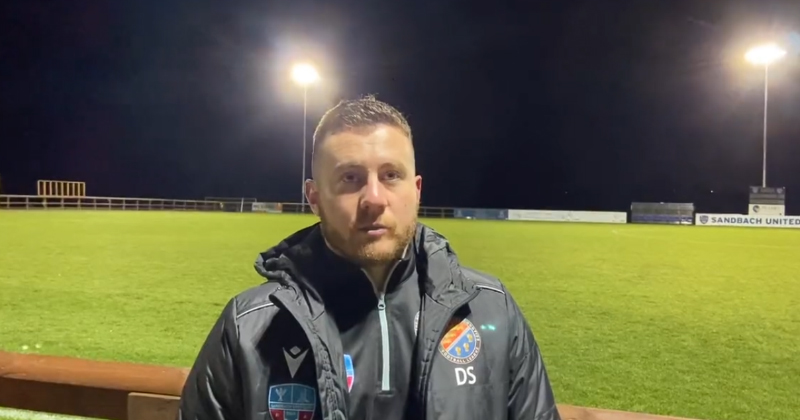
2.00pm
I’m also teaching a unit on careers, which involves helping learners write CVs and cover letters. We spend some time exploring different jobs that they might want to go for.
The sports sector is a busy one, there are lots of jobs available. A lot of my learners chose this course because they love playing football. But when a young person enters non-league football, if they’re in it for the money, they’re probably in it for the wrong reasons. And the standard of football expected of them is a lot better than they think.
Out of all the kids who are trained up, there might be only one who makes it as a paid professional. I try to make sure my learners understand that.
Part of my job involves trying to show them they could channel their passion for sport into doing something completely different – perhaps as a teacher.
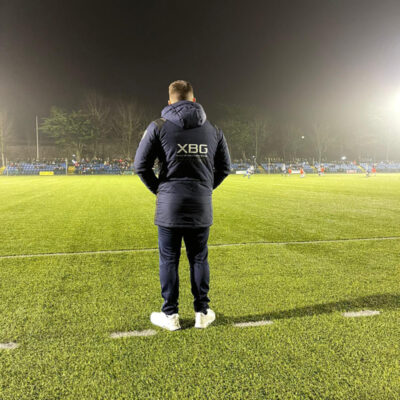
4.15pm
I finish up, check my emails and I’m on the road to tonight’s match.
The anticipation is building when I arrive. The floodlights are on, and there’s a lovely smell of burgers cooking.
I take myself away from everyone to go over in my head what I’m going to say to my players before entering the changing room. There’s a crossover in the skills I use in teaching coaching, and how I talk to my players before the match. It’s just different pressures.
My players range from 17 to 36 and include university students, labourers and an estate agent. They travel in from as far afield as Manchester and Liverpool.
In my first full season as manager we got to the playoff final at home and lost. The following season, we got to the playoffs again and lost in the semi-finals – it’s frustrating that we keep getting so close.
When you’ve got the community coming together to watch the game in those moments, with the cheering and the drums, it’s a real occasion. Tonight, there are about 200 people watching us.
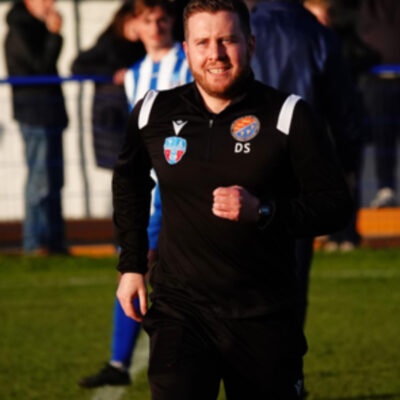
6.45pm
I see what the opposition have put out and we have our team talk, warm up, then it’s back into the changing rooms to sort the boots out before kick off.
During the game itself, I’m not a screamer or a swearer. But my players know by my demeanour when I’m frustrated. I see my style as being like that of Pep Guardiola.
When that final whistle blows, if we’ve won then the sense of elation is unbeatable.
9.40pm
After the game and our post-match chat, I do an interview for social media, then drive home. The journey might take two hours if it’s an away match so I might not be home until after midnight. I take a shower and check my phone before trying to sleep.
I’m still buzzing for several hours after a game because of the adrenaline rush.
The hardest thing for me about balancing my two jobs is not getting enough sleep. I know the dog’s going to wake me up for a walk at 6.30am!
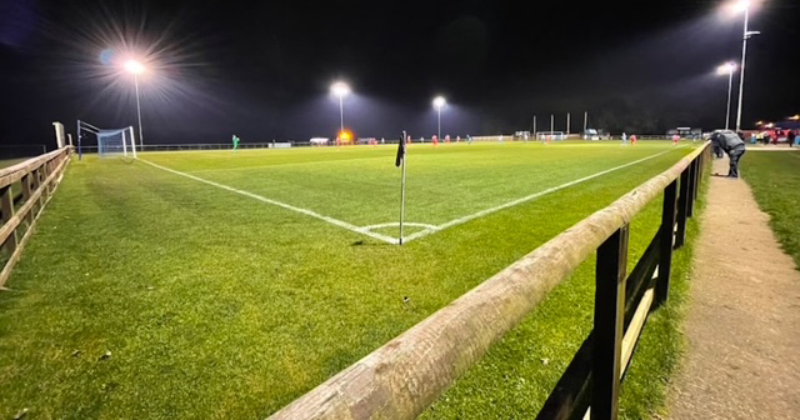


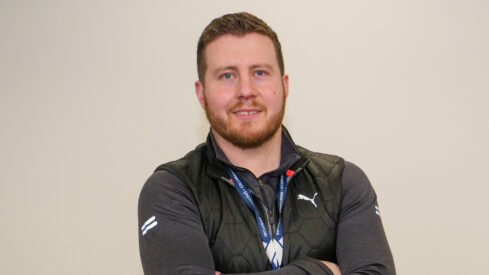






Your thoughts